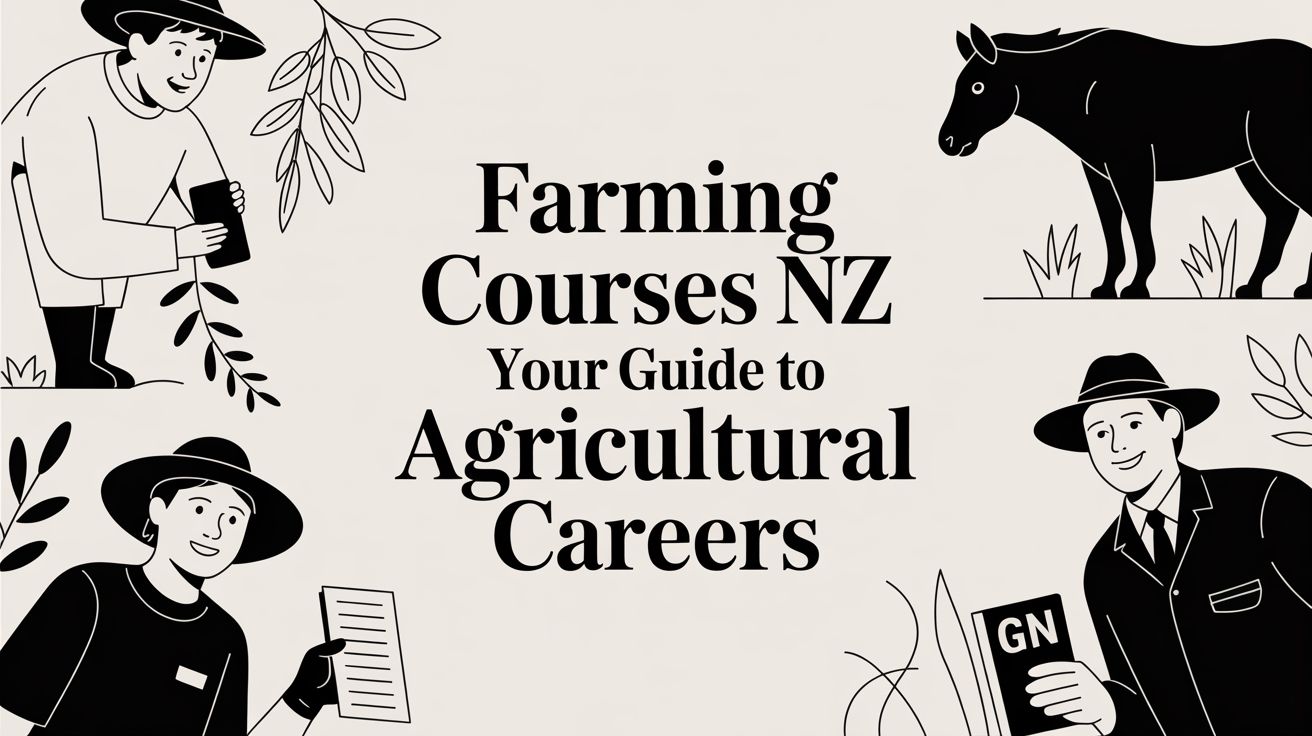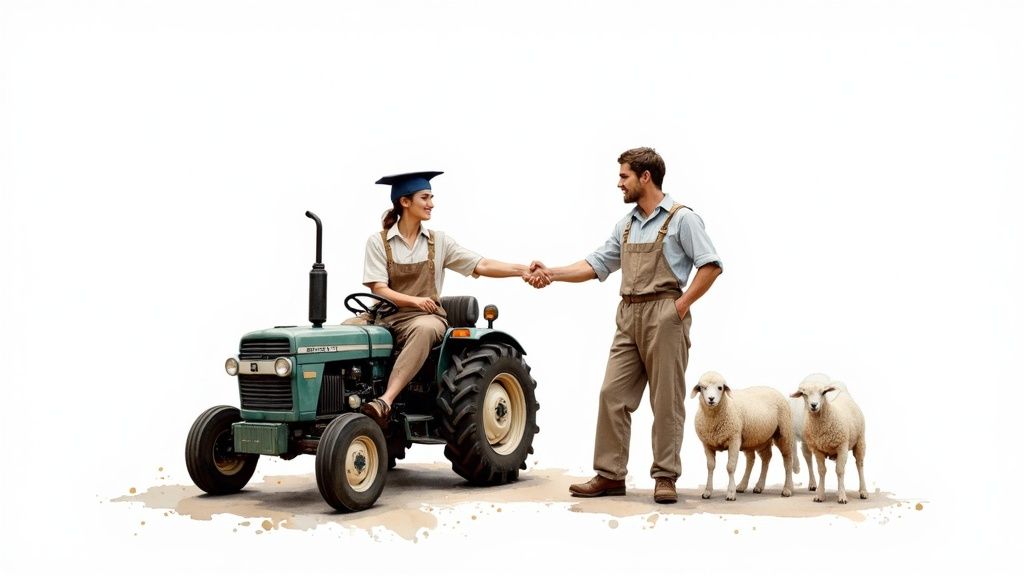
Farming Courses NZ Your Guide to Agricultural Careers
Thinking about a career in New Zealand's primary industries? Finding the right farming course in NZ is your first real step into a sector that's the absolute backbone of our economy. From hands-on certificates to more advanced diplomas, think of this guide as your roadmap to getting started.
Your Agricultural Career Starts Here in New Zealand
New Zealand's primary industries are so much more than just farms. They're a world-leading network of science, technology, and business, all centred on food production. This is a dynamic world, and it's constantly evolving, which means there's always a high demand for skilled, knowledgeable people to drive it forward. Committing to a course is your entry ticket into this essential and genuinely rewarding field.
It's an industry that offers stable, fulfilling career paths. The scope is massive, stretching way beyond the farm gate into roles in agribusiness, rural finance, environmental management, and agricultural technology. Choosing to study agriculture here in NZ is an investment in a future with real, tangible opportunities for growth.
A Pillar of the Kiwi Economy
The sheer scale of this sector really highlights its importance. New Zealand's agricultural education system is vital for getting the next generation ready for these key roles. As of March 2023, the primary sector employed around 360,000 people—that's roughly 12.4% of New Zealand's entire workforce, which shows just how critical this industry is to the country's economic health. You can explore more about the role of agricultural education in New Zealand and its impact on the nation's workforce.
This chart gives a great snapshot of the diverse makeup of New Zealand's agricultural exports.

As you can see, the sector isn't just propped up by one product; dairy, meat, horticulture, and forestry all make huge contributions. This diversity creates a resilient industry with a massive array of career specialisations available once you've got your qualification.
What This Guide Covers
This guide is designed to walk you through the entire landscape of farming courses NZ has on offer. We'll cover everything you need to know to make a solid, informed decision about your future.
- Course Types and Levels: From hands-on certificates to strategic agribusiness diplomas.
- Choosing the Right Programme: How to weigh up accreditation, delivery modes, and practical components.
- Costs and Funding: A clear breakdown of tuition fees and what financial support is out there.
- Career Pathways: What kind of jobs you can aim for after you graduate.
By the end of this guide, you'll have a clear picture of the steps needed to find your perfect fit in one of New Zealand’s most important and future-focused industries.
Navigating the sheer variety of farming courses in New Zealand can feel like trying to find your way around a massive farm without a map. The trick is to see each qualification as a stepping stone on a clear career path.
Think of it like building your career from the ground up, starting with the hands-on skills you’ll use in the paddock every day, then layering on the strategic thinking needed to run the entire operation from the farm office. This structure lets you jump in at a level that fits your experience and ambition, whether you're fresh out of school or a seasoned pro looking to sharpen your skills.
Let's break down the main qualifications so you can figure out exactly where you fit in.

Certificates: Your Practical Foundation
Certificates, usually sitting at Levels 2 to 4 on the New Zealand Qualifications Framework (NZQF), are your ticket into the agricultural industry. These courses are all about getting your hands dirty. They’re intensely practical, focusing on the core skills needed for day-to-day farm work. You’ll be learning the nuts and bolts of animal handling, pasture management, fencing, and how to operate farm machinery safely.
These qualifications are a perfect match for people who:
- Are brand new to farming and have little to no experience.
- Learn best by doing, not by sitting in a classroom.
- Want to get the right skills quickly for an entry-level job like a farm assistant, shepherd, or dairy farmhand.
A certificate gives you the competence and confidence to be a useful member of the team from day one. Many of these practical agriculture and farming certificates are even available online, so you can learn around your existing work schedule.
Diplomas: Building Your Management Muscle
Once you’ve got a solid base of practical skills under your belt, a Diploma (Levels 5-6) is the natural next move if you're aiming higher. These programmes add a vital layer of business, financial, and people management skills on top of what you already know. The focus shifts from simply doing the work to managing the work, the people, and the money.
You’ll dive into topics like feed budgeting, financial planning, managing staff, and gaining a much deeper understanding of agricultural production systems. This is the ideal qualification for anyone looking to step into a leadership role, such as a farm manager, stock manager, or rural consultant. It gives you the strategic mindset needed to run a farm that’s not just productive, but profitable and sustainable too.
To make it clearer, here’s a quick rundown of how these qualifications stack up against each other.
NZ Farming Qualifications at a Glance
This table shows the clear progression available, allowing you to build your expertise piece by piece as your career grows.
Short Courses and Micro-credentials: Targeted Upskilling
Beyond the traditional qualifications, the farming world is full of specialised short courses and micro-credentials. These are sharp, focused learning opportunities designed to teach you a specific skill quickly and effectively. They're perfect for upskilling in a niche area without having to commit to a long-term programme.
These specialised courses are a direct response to how fast the industry is changing. Farming is getting more technical, and being able to quickly pick up new tools and techniques gives you a massive career advantage.
Modern farming is increasingly about innovation. For instance, you could take a course on precision agriculture with drones to completely modernise how a farm is managed—a skill that’s becoming incredibly valuable. Other courses might cover regenerative agriculture, livestock genetics, or advanced soil science. This flexible approach means you can keep adding new skills to your toolkit, staying relevant and in demand.
How to Choose the Right Farming Course for Your Goals
Picking the right farming course in NZ feels like a big deal—because it is. This decision really sets the compass for your career, so it pays to take your time and match a qualification to where you actually want to end up. Think of it like planning your stock rotation; you need a solid strategy to get the best outcome.
With a massive range of farming courses nz offers, from online certificates to full-on diplomas, a bit of a framework can make all the difference. Instead of just grabbing the first one that looks good, let's walk through how to break it down. This will help you weigh up the factors that separate a decent course from the perfect one for you.

Start with Accreditation and Recognition
First things first, check the accreditation. Is the qualification recognised by the New Zealand Qualifications Authority (NZQA)? Honestly, this is a non-negotiable. An NZQA-approved course is your guarantee of quality, and it ensures employers across the country (and often overseas) will take your qualification seriously.
Beyond the official tick of approval, look for industry recognition. Do big players like DairyNZ or Beef + Lamb New Zealand have a partnership with the provider? That's a huge clue that the course content is relevant, up-to-date, and teaching what the industry actually needs.
Consider the Delivery Mode
How you learn is just as important as what you learn. In New Zealand, providers offer a few different ways to study, and each one suits a different lifestyle.
- On-Campus Learning: This is brilliant if you thrive in a structured, face-to-face environment. You get direct access to tutors and get to use campus facilities like training farms.
- Online Learning: Offers incredible flexibility. If you're already working or have family commitments, this lets you fit study in around your life, not the other way around. It's a game-changer for people already on a farm who want to upskill.
- Blended or Hybrid Learning: This gives you the best of both worlds—you get the flexibility of online theory combined with essential in-person practical workshops or block courses.
The right mode comes down to your personal situation. If you’re a hands-on learner starting from square one, a campus-based course could be the ticket. But if you’re already in a job and need to earn while you learn, online is a seriously powerful option.
You can see the demand for flexible study in the numbers. Across all tertiary levels in 2024, around 3,950 domestic students were enrolled in agricultural studies. The gender split is pretty even and the ages are all over the map, which just goes to show people are jumping into agricultural education at every stage of life. It makes flexible learning a must-have. You can dig into more about New Zealand's agricultural student demographics here.
Evaluate the Practical Components
Farming is hands-on. Your training has to be, too. A top-tier course will have a massive practical element baked right into the curriculum. When you're looking at different options, don't be shy about asking specific questions.
Does the provider have its own training farm, or do they have solid partnerships with commercial farms? What kind of work placements are part of the deal? Real-world experience is where the theory finally clicks into place. It’s also where you’ll make those crucial industry connections that can land you a job when you graduate.
Putting It All Together A Real-World Example
Let's put this into practice. Meet Alex, who's working as a farmhand but has their sights set on becoming a dairy farm manager. Alex needs a qualification that adds management skills to their practical experience, but they can't afford to just quit their job.
Here’s how Alex uses this framework to find the right fit:
- Goal: Become a dairy farm manager. This tells them to aim for a Diploma (Level 5 or 6), not a basic certificate.
- Accreditation: Alex immediately filters the search to only show NZQA-approved diplomas that the dairy industry actually respects.
- Delivery Mode: Because Alex has to keep working, a fully online or blended learning course is the only way to go. This lets them study in the evenings or on weekends without missing a paycheck.
- Practical Component: Alex finds a programme with practical assessments that can be done on their current farm, with their boss verifying the work. This "earn while you learn" setup is perfect.
- Final Choice: Alex lands on a course like the Advanced Dairy Farm Management bundle. It's delivered online and dives deep into the business and herd management skills they need for that next step up.
By following a clear process, Alex picks a course that directly backs their career goals and fits their life, making sure that investment of time and money is going to pay off.
Navigating Course Costs and Funding Your Education
Taking on a farming course is one of the smartest investments you can make in your future, but it’s completely natural to think about the financial side of things first. The cost of farming courses NZ offers can vary quite a bit, depending on the level and length of the qualification you’re after.
A short, specialised course might set you back a few hundred dollars, while a full-blown diploma or university degree is obviously a much bigger financial commitment. The key is to stop thinking of it as a cost and start seeing it for what it is: an investment with a clear payoff. The right qualification swings open doors to better-paying jobs, more security, and the know-how to run a profitable farm business.
The good news? You don’t have to figure it all out on your own. New Zealand has a solid system of financial support ready to help you get started.
Government Support and Student Loans
For most Kiwis heading into tertiary education for the first time, the government’s Fees Free scheme is the first place to look. If you’re a first-time student, you could get your first year of study or training covered, up to a massive $12,000. This is a huge leg-up for anyone enrolling in a Level 3 (or higher) certificate or diploma, taking a lot of the initial financial pressure off.
Beyond that, the Student Loan scheme, run by StudyLink, is how thousands of Kiwis fund their education. It lets you borrow money for your tuition fees and course-related costs, and you can even get a living allowance to help with day-to-day expenses.
Best of all, the loan is interest-free as long as you’re living in New Zealand. You only start paying it back once you’re earning over a certain amount, which makes it a really manageable way to back yourself.
Industry Scholarships and Grants
New Zealand's primary industries are always on the lookout for fresh talent and are genuinely invested in helping people get their start. Because of this, many industry bodies offer generous scholarships specifically for agricultural students. And they aren't just for uni students—plenty are aimed squarely at people doing vocational training.
Think of industry scholarships as a vote of confidence. When an organisation like DairyNZ or Beef + Lamb New Zealand invests in your education, they are signalling that you have the potential to be a future leader in their field.
These scholarships can be a game-changer, often covering a huge chunk of your tuition or living costs. It’s always worth spending a bit of time on the websites of the main industry players to see what funding they’ve got going.
- DairyNZ Scholarships: A whole range of awards for people passionate about getting into the dairy sector.
- Beef + Lamb New Zealand Scholarships: Support for students who see their future in the sheep and beef industry.
- Horticulture New Zealand Scholarships: Funding for those keen to get into New Zealand’s booming horticulture scene.
Earn While You Learn Pathways
Let’s be honest, one of the most practical and financially savvy ways to get qualified is to earn while you learn. These pathways are incredibly popular because you don’t have to choose between getting a paycheque and getting qualified—you do both at the same time.
Apprenticeships are a classic example. Run by organisations like the Primary ITO, an apprenticeship mixes full-time, paid work on a farm with structured training blocks. You get a nationally recognised qualification while earning a proper wage, and your employer is directly investing in your skills. It's a win-win.
Similarly, cadetships offer a full-immersion training experience right on the farm. These are often live-in roles where you get hands-on experience across every part of a specific farm's operation.
Both options give you a direct pathway into the industry, slash potential student debt, and make sure the skills you're learning are immediately useful. For anyone eager to just get stuck in, they are a powerful choice.
Your Career Path After Graduation

Finishing your farming course isn't the end of the road—it’s the starting line. Think of that qualification as your ticket into a thriving industry that’s crying out for skilled people. What happens next is a mix of your ambition and the type of qualification you've just earned.
A good way to look at it is that a certificate gives you the keys to the farm ute, while a diploma hands you the farm’s business plan. Both are critical for running a successful operation, but they open up very different doors and lead to a huge range of exciting opportunities.
From Certificate to Skilled Operator
Earning a foundational certificate (Levels 2-4) makes you a seriously valuable, work-ready candidate right from day one. Employers know you've got the practical skills to get stuck in without needing your hand held. This qualification is your gateway to essential on-farm roles where the real-world learning kicks into high gear.
Common paths for certificate holders include:
- General Farm Hand: The absolute backbone of any farm, tackling everything from fencing and machinery work to handling stock.
- Shepherd or Shepherd General: A specialist role in the sheep and beef sector, focused on managing flocks, keeping an eye on animal health, and stock movements.
- Dairy Farm Assistant: A vital cog in the machine on a dairy farm, helping with milking, calf rearing, and keeping pastures in top condition.
- Junior Stock Manager: Your first step onto the management ladder, helping with stock records, breeding programmes, and health strategies.
These roles are all about rolling up your sleeves and building experience. Combine your qualification with on-the-job know-how, and you’ll be building a rock-solid foundation for the future. It’s here you prove your work ethic and start climbing.
Diploma Pathways to Leadership and Beyond
A diploma (Levels 5-6) tells employers you’re ready for more than just the day-to-day grind; you’re equipped to think strategically. It opens up a much broader set of career options, taking you beyond the paddock and into management, advisory, and technical roles.
A diploma doesn't just teach you how to farm; it teaches you how to run a farming business. This shift in thinking is exactly what makes graduates so sought-after for leadership roles where profitability and sustainability are everything.
With a diploma under your belt, you can set your sights on positions like:
- Farm Manager or Operations Manager: Overseeing the entire farm, from budgets and staff to production planning and compliance.
- Stock or Herd Manager: Taking full ownership of the performance, health, and genetics of the farm’s livestock.
- Agri-Tech Sales Consultant: Working for companies providing cutting-edge solutions to farms, from drone tech to smart software.
- Rural Banking Professional: Using your deep understanding of farm systems to help farmers with finance, investment, and planning.
- Fertiliser Representative: Giving expert advice to farmers on soil health and nutrient management to get the most out of their land.
As you move up, understanding every part of a farm operation becomes crucial, right down to the infrastructure that makes it all possible, like the different types of agricultural steel buildings. This broad knowledge makes you a far more effective and valuable leader.
What Your Career Could Look Like
To give you a clearer picture, here’s a look at some common career paths in New Zealand agriculture and what you might expect to earn as you gain experience.
Potential Career Paths and Salary Ranges in NZ Agriculture
These figures are a guide, of course. Your actual earnings will depend on your experience, the farm's location, and how much responsibility you take on. The key takeaway? There's massive potential for growth.
Job Security in a High-Demand Sector
The need for qualified people in New Zealand’s primary industries isn't just strong—it’s urgent. Projections show we need around 50,000 more skilled people by 2025 to keep the sector thriving. This is driven by the global need to feed a population rocketing towards 10 billion by 2050.
This skills shortage translates directly into fantastic job security and real career momentum for qualified grads. Employers are actively hunting for people who have invested in their own training. Completing a targeted course, like a dedicated Certificate in Livestock Management, is proof you have the specific, modern skills they’re desperate for.
At the end of the day, your qualification is much more than a piece of paper. It’s evidence that you have the knowledge, the hands-on ability, and the drive to build a successful career in one of New Zealand's most vital sectors. The opportunities are out there, waiting for you to grab them.
Top Providers for Farming Courses in New Zealand
Choosing where you study is just as important as deciding what you'll study. The world of farming courses NZ offers is pretty diverse, with each place catering to different learning styles and career goals. Think of it like picking the right tool for a job on the farm; a university is perfect for the deep research side of things, while a hands-on training centre is where you’ll get your hands dirty and learn the practical skills.
Finding the right environment for you is what will set you up for success. Let’s walk through some of the top providers to help you match your ambitions to the right institution.
Universities for Academic Excellence
For those with their eyes on a career in research, agricultural science, or high-level agribusiness management, a university is the gold standard. They offer degree programmes (Level 7 and up) that really dig into the science and economics driving modern agriculture.
Two of New Zealand’s real leaders in this space are:
- Lincoln University: A specialist land-based university that has a global reputation for its work in agriculture and agribusiness.
- Massey University: Well-known for its strong Bachelor of AgriScience and AgriCommerce programmes, giving you a solid education in everything from soil science to farm management.
These are the places to be if your goal is to innovate and lead the industry from a scientific or strategic angle.
Industry-Embedded Training Providers
If you’re the type who believes the best way to learn is by actually doing the job, then work-based training providers are an excellent fit. These outfits blend on-the-job experience with structured learning, meaning you can earn a wage while you’re getting qualified.
Primary ITO (now part of Te Pūkenga) is the heavyweight in this category. They are the go-to industry training organisation for the primary sector, coordinating apprenticeships and training programmes all over the country that are deeply connected to real-world farm operations.
This pathway is perfect for anyone wanting a direct line into the industry, letting you build skills and connections right from the get-go.
Vocational and Hands-On Institutions
For practical, vocational training that mixes classroom theory with a whole lot of on-site farm work, polytechnics and dedicated agricultural training centres are fantastic. These providers often have their own working farms, giving you a safe and supportive space to apply everything you learn.
A classic example here is Telford (part of SIT/Te Pūkenga), which has a long-standing reputation for its immersive, hands-on agricultural programmes. This kind of institution is brilliant at getting students ready for the practical realities of farm work and management.
Got questions about getting into a farming course? You're not alone. Figuring out the world of agricultural training can feel a bit daunting at first, but it's a lot more straightforward than you might think. We get a lot of the same queries from people keen to jump into one of New Zealand’s most important industries.
Let's clear things up and tackle some of the most common questions head-on. Our goal is to give you the confidence to take that next step, fully armed with the right info.
Do I Need Farm Experience to Get Started?
This is a big one, and the short answer is almost always no. Most of the entry-level certificate courses (we're talking Levels 2-4) are built from the ground up for people with little to no experience. They’re designed to be your starting line, teaching you the foundational skills you need to get going.
Providers know that everyone has to start somewhere. If you're keen to get a taste of farm life before you commit, why not try some weekend relief milking or lend a hand during the busy seasons like lambing or calving? It’s a brilliant way to confirm that this is the right track for you.
Can I Study Part-Time While I Work?
Absolutely. The agricultural education sector in New Zealand is fantastic at catering for people who need to juggle work, family, and study. Plenty of providers offer incredibly flexible options designed for exactly this kind of real-life situation.
You can often find farming courses with:
- Part-time schedules that let you spread the learning over a longer timeframe.
- Online modules you can chip away at in your own time, from anywhere you've got an internet connection.
- Block courses that pack the learning into short, intensive bursts on campus, minimising your time away from work.
These setups make it totally possible to earn a new qualification without hitting pause on your life or your income.
Key Takeaway: Don't forget, New Zealand’s NZQA-accredited farming qualifications are well-regarded all over the world. Your skills will open doors in countries with similar farming systems, like Australia, the UK, and Ireland, giving you a ticket to global career opportunities.
What Is the Difference Between a Cadetship and an Apprenticeship?
Both of these are fantastic 'earn while you learn' options, but they're structured a bit differently. A simple way to think about it is that a cadetship is a deep, immersive dive on one specific farm, whereas an apprenticeship is a nationally structured programme.
A cadetship is usually a live-in training setup where you’re based full-time on a single farm or station. You learn the unique systems and rhythms of that one operation inside out, often building a really close mentoring relationship with the farm owner or manager.
An apprenticeship, on the other hand, is a formal, nationally recognised training scheme, often run through an organisation like Primary ITO. It's a mix of paid on-the-job work with organised off-site training blocks or online study. This pathway makes sure you’re learning a standardised, industry-approved curriculum that you can take with you to any farm in the country.
.webp)

